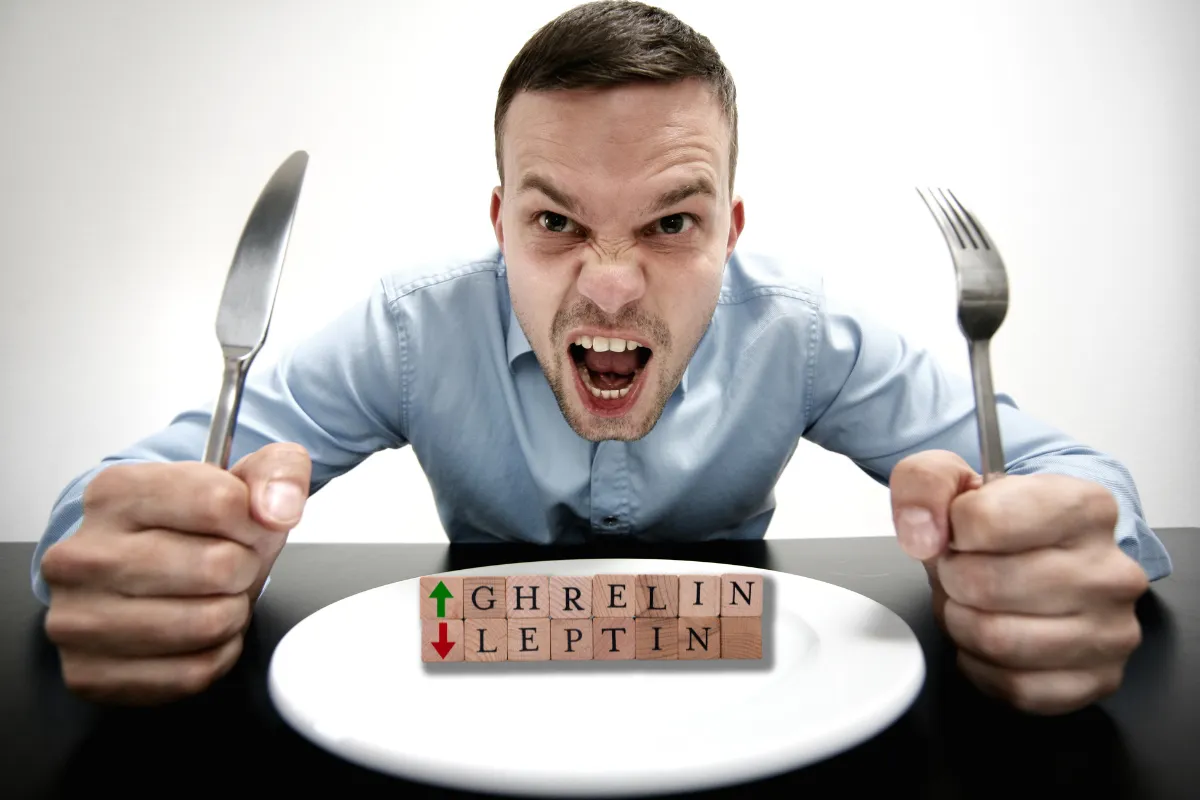
The PrimeFit Journal
Health, strength and mindset coaching for midlife professionals.
Whether you’re over 40, managing a condition like Type 2 diabetes or PCOS, or simply training with more purpose, this is your evidence-based resource for building real strength and lasting energy—without gimmicks or overwhelm. I’m Rob, a personal trainer and nutrition coach, and I use this space to help you live better through smart, sustainable choices.

Why You're Always Hungry: The Hormonal Conspiracy Unveiled!
We've all been there—sitting on the sofa, staring at the ceiling, and wondering why we're still hungry even though we just had a full meal. If this sounds like you, you're not alone. What if the reason you're always hungry isn't a lack of willpower but a hormonal conspiracy inside your body? Let's dive in and unveil the hormonal factors that might keep you from achieving your weight loss goals.
The Science of Hunger and Satiety
Before we get into the nitty-gritty, it's essential to understand the biological mechanisms behind our appetite. Hunger and fullness are regulated by hormones like ghrelin, known as the "hunger hormone," and leptin, the "satiety hormone." These hormones don't always play fair, especially when factors like stress, sleep deprivation, and diet come into play. So, let's delve deeper into these hormones to understand how they work and how we can keep them in check.
The Role of Ghrelin: The Hunger Hormone
Ghrelin is your body's way of telling you it's time to eat. Produced mainly in the stomach, this hormone signals your brain to initiate feelings of hunger. But it's not just about when you last ate; factors like sleep deprivation and stress can also influence ghrelin levels. So, how can you keep this "hunger hormone" in check? Adequate sleep and stress management can play a significant role. Still, we must also consider the role of other hormones that affect appetite. Let's look at leptin, which tells you when you've had enough.
Leptin: The Satiety Hormone
Leptin is produced by your fat cells and signals your brain to suppress appetite. However, the body can become resistant to leptin, making it difficult to feel full and leading to overeating. So, how can you make sure your body listens to leptin? Exercise and dietary choices can have a profound impact, which brings us to our next point—insulin.
Insulin: The Blood Sugar Regulator
While insulin is often associated with blood sugar control, it also plays a pivotal role in regulating hunger and satiety. Produced by the pancreas, insulin helps cells absorb glucose from the bloodstream. When it comes to appetite, insulin works in tandem with leptin to signal the brain that enough food has been consumed.
A meta-analysis published in "Diabetes Care" found that insulin regulates blood sugar and directly impacts the brain's hunger centres, influencing appetite and food intake. For those dealing with diabetes, the relationship between insulin and hunger becomes even more complex. A systematic review in the "Journal of Clinical Endocrinology & Metabolism" highlighted the intricate interplay between insulin and other hormones in regulating appetite in diabetic patients.
Insulin resistance, a condition where cells become less responsive to insulin, can lead to increased hunger and weight gain. Other large-scale studies found that insulin resistance is strongly associated with obesity and crucial to developing Type 2 diabetes.
So, what can be done to maintain insulin sensitivity? As we'll explore in subsequent sections, lifestyle factors like exercise and sleep can significantly impact. But first, let's delve into how exercise and sleep themselves are influenced by these hormones.
The Impact of Exercise on Hormones
You might already know exercise benefits your heart, muscles, and overall well-being. But did you know it can also profoundly impact your hunger hormones? Exercise can improve insulin sensitivity, regulate ghrelin levels, and even enhance leptin sensitivity, helping you feel fuller for longer.
A meta-analysis published in the "Journal of Sport and Health Science" found that aerobic exercise, in particular, significantly lowers ghrelin levels and increases leptin levels. Strength training, too, has its benefits. A systematic review in "Metabolism: Clinical and Experimental" found that resistance training improves insulin sensitivity, which can help regulate appetite.
But it's not just about the type of exercise; timing matters too. A study in the "International Journal of Obesity" found that exercising before meals can lower ghrelin levels and reduce food intake, aiding in weight loss.
Incorporating a balanced exercise regimen into your lifestyle can be a game-changer in regulating your hunger hormones and achieving your weight loss goals.
The Importance of Sleep in Hormonal Balance
We often underestimate the power of a good night's sleep. Still, when it comes to hormonal balance, sleep is a non-negotiable factor. Inadequate sleep can wreak havoc on your hunger hormones, increasing appetite and weight gain.
A Cochrane review found that sleep deprivation is associated with hormone changes like ghrelin and leptin, increasing appetite and caloric intake. Another "Sleep Medicine Reviews" meta-analysis confirmed that lack of sleep is associated with elevated ghrelin levels and reduced leptin levels, contributing to increased hunger and weight gain.
Even the quality of sleep matters. A study published in the "Journal of Clinical Sleep Medicine" found that poor sleep quality, characterized by frequent awakenings or reduced deep sleep, can also lead to hormonal imbalances affecting appetite.
So, how can you improve your sleep and, by extension, your hormonal balance? As we'll explore in subsequent sections, lifestyle choices like stress management and dietary adjustments can significantly impact sleep quality.
The Hormonal Imbalance
By this point, you might think that hunger and fullness are more complicated than you initially thought. And you'd be right. These feelings are part of a complex system influenced by stress, diet, exercise, and sleep. When these elements are out of sync, your hunger hormones can be chaotic, leading to a cycle of overeating and weight gain.
The key takeaway is that these hormones—ghrelin, leptin, and insulin—don't work in isolation. They're part of a bigger picture, influenced by your lifestyle choices and emotional state. Stress, for instance, can elevate cortisol levels, another hormone that plays a role in appetite.
So, what's the solution? How can you break this cycle of never-ending hunger?
Lifestyle Factors That Affect Hormonal Balance
You might wonder, "Okay, so my hormones are out of whack. What can I do about it?" The good news is that you have more control than you might think. Simple lifestyle changes can go a long way in helping you regain hormonal balance and, as a result, control over your appetite.
Exercise
As mentioned earlier, regular physical activity can help regulate your hunger hormones. Whether it's a brisk walk, a jog, or a full-blown gym session, exercise can improve insulin sensitivity and help balance ghrelin and leptin levels.
Sleep
Don't underestimate the power of a good night's sleep. Poor sleep can affect your hormones, increasing hunger and weight gain. Aim for at least 7-8 hours of quality sleep per night to keep your hormones in check.
Stress Management
Stress can be a silent saboteur when it comes to weight management. Techniques like mindfulness, meditation, and even simple breathing exercises can help lower stress levels and, in turn, balance your hormones.
So, as you can see, lifestyle choices play a significant role in regulating your hunger hormones.
Dietary Choices for Hormonal Balance
When it comes to food, not all calories are created equal. The types of food you eat can significantly impact your hunger hormones. These dietary choices can help you balance those hormones and your appetite.
High-Fiber Foods
Fruits, vegetables, and whole grains are fibre-rich, which can help you feel full longer and keep those hunger pangs at bay.
Protein-Rich Meals
Lean meats, fish, and plant-based proteins like lentils and chickpeas can help regulate your appetite by affecting hormones that signal fullness.
Healthy Fats
Avocado, nuts, and olive oil are healthy fats that can help regulate your hunger hormones and provide sustained energy.
By making these dietary choices, you're feeding your body and sending the right signals to your brain to help regulate your appetite. It's a win-win situation for both your waistline and your well-being.
Empowering Your Journey to Hormonal Balance and Healthier Living
Navigating the world of hunger hormones might seem like a daunting task, but the truth is you have more control than you think. By understanding the role of hormones like ghrelin, leptin, and insulin and making mindful lifestyle and dietary choices, you can take the reins on your appetite and, ultimately, your health.
So, if you've been wondering why you're always hungry, remember that the answer—and the solution—might be more within your reach than you've ever imagined. It's not just about willpower; it's about understanding your body's signals and responding in a way that serves you best.
References
Cummings, D E., Purnell, J Q., Frayo, R S., Schmidova, K., Wisse, B E., & Weigle, D S. (2001). A preprandial rise in plasma ghrelin levels suggests a role in meal initiation in humans. Diabetes.
https://pubmed.ncbi.nlm.nih.gov/11473029/
Tschöp, M., Smiley, D L., & Heiman, M L. (2000). Ghrelin induces adiposity in rodents. Nature.
https://pubmed.ncbi.nlm.nih.gov/11057670/
Friedman, J M., & Halaas, J L. (1998). Leptin and the regulation of body weight in mammals. Nature.
https://pubmed.ncbi.nlm.nih.gov/9796811/
Saltiel, A R., & Kahn, C R. (2001). Insulin signalling and the regulation of glucose and lipid metabolism. Nature.
https://pubmed.ncbi.nlm.nih.gov/11742412/
Martins, C., Kulseng, B., King, N A., Holst, J J., & Blundell, J E. (2010). The effects of exercise-induced weight loss on appetite-related peptides and motivation to eat. Journal of Clinical Endocrinology & Metabolism.
https://pubmed.ncbi.nlm.nih.gov/20150577/
Spiegel, K., Tasali, E., Penev, P., & Van Cauter, E. (2004). Brief communication: Sleep curtailment in healthy young men is associated with decreased leptin levels, elevated ghrelin levels, and increased hunger and appetite. Annals of Internal Medicine.
https://pubmed.ncbi.nlm.nih.gov/15583226/
Drewnowski, A., & Almiron-Roig, E. (2010). Human perceptions and preferences for fat-rich foods. In Montmayeur J.P., le Coutre J. (Eds.), Fat Detection: Taste, Texture, and Post Ingestive Effects.
https://pubmed.ncbi.nlm.nih.gov/21452463/
Disclaimer: This blog post is intended for informational purposes only and does not constitute medical advice. While I am a certified Nutritionist, Personal Trainer, and Spartan SGX Coach, I am not a healthcare professional. The information provided in this post is based on my personal experiences, professional expertise, and available research. It should not be used as a substitute for professional medical advice, diagnosis, or treatment. Always seek the advice of your healthcare provider with any questions you may have regarding a medical condition or treatment before undertaking a new healthcare regimen. Never disregard professional medical advice or delay seeking it because of something you have read on this blog.
Copyright 2025 Ede Fitness, All Rights | Privacy Policy | Terms & Conditions

